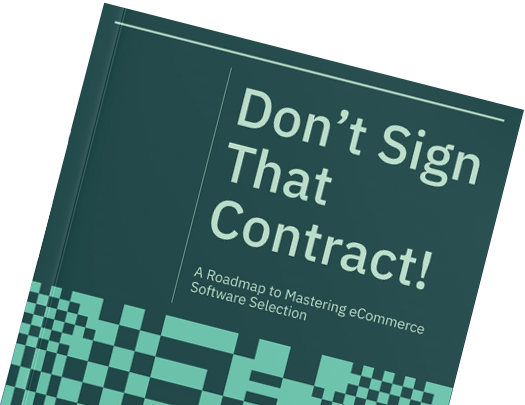Choosing the right ecommerce platform for your business is no easy task. In fact, it can be downright overwhelming with the hope of business transformation and claims to meet your specific needs, the decision-making process can feel like a game of chance with the hidden biases and misconceptions in the ecommerce software selection process. Whether an agency partner like TORQ helping clients make the best decision, or a merchant navigating the options yourself, the stakes are high, and the consequences of a wrong choice for your business can be very disruptive and costly.
In this blog, we’re sharing a synopsis of the key takeaways, insights from a new guide released from Future Commerce sharing results from their recent research of online merchants:
Navigating the Software Selection Process
The ecommerce software landscape is championed by business relationships, and at times tangled agendas and biases. As a systems integration agency partner, we experience first-hand the lack of informed decisions based on existing vendor relationships, and the role it plays in software selection decisions. Merchants often end up recommending or purchasing the same platforms repeatedly—regardless of complexity, budget, or timeline —skewed by existing relationships and pre-established opinions and sometimes unawareness of alternative options for them.
In many cases, the decision to choose one software over another is influenced by factors that have little to do with what’s actually best for the business. Merchants and agencies navigate this maze of half-truths, where the true motivations behind recommendations often remain hidden.
Future Commerce recently conducted research among 100 merchants and 10 agencies to understand what truly matters in the RFP (Request for Proposal) and software selection process. The results were eye-opening, shedding light on several key issues.
The Rise of the RFP
Once hailed as an objective tool for evaluating software platforms, the RFP process has become a conduit for false promises and misaligned expectations. Their report found that 82% of merchants expect that the delivery of a platform will "vary drastically from the promises made in the sales process."
The RFP is intended to provide clarity and structure to the decision-making process. But in practice, it’s often a ritual in due diligence—one that doesn’t always lead to the best outcome. Agencies (like TORQ) want to be a trusted advisor. We engage in elaborate pitches and merchants often view the RFP as a necessary formality rather than a genuine guide to selection.
Speed vs. Customization Tug-of-War
One of the most common tensions in software selection is the battle between speed to market and the need for customization. The research found that 81% of merchants prioritize speed to market as the most important factor in realizing revenue growth. Yet, at the same time, 86% of merchants say that customization is crucial in their decision-making process.
Customization is often touted as one of the biggest advantages of a platform, but there’s a catch. While 86% of merchants agree that customization is crucial, the reality is that many businesses are adapting to the platform rather than the other way around. This can lead to a situation where your business processes are shaped by the limitations of the software, rather than the platform supporting the way your business truly works. Just because a platform can be customized, should it be? In many cases, what seems like a flexibility advantage can quickly turn into a headache if the customization doesn’t align with long-term business goals, and results in excessively expensive and drawn out project implementations.
This tug-of-war often forces businesses into difficult decisions. Should you choose a pre-built solution that promises a faster rollout but lacks flexibility? Or do you invest in a more customizable platform that could take longer to implement but offers better long-term value? The answer isn’t always clear. The key is understanding that while customization is important, the ability to adapt quickly to market demands can be just as critical.
The Ripple Effect of Misaligned Platforms
The consequences of choosing the wrong ecommerce platform extend far beyond implementation headaches. Misaligned software can create a ripple effect that impacts everything from your team’s productivity to your customer’s experience.
-
Financial Fallout: Budget overruns and lost revenue are just the tip of the iceberg. When a platform doesn’t deliver as promised, the financial consequences can be severe—leading to missed opportunities and costly inefficiencies.
-
Operational Nightmares: Poorly integrated platforms often lead to increased friction within your tech stack, turning simple tasks into major development efforts. What should be a seamless process instead becomes a bottleneck, frustrating the client and development teams.
-
Brand Reputation: In today’s age of social media and online reviews, a glitchy platform isn’t just an internal problem—it’s a public one. Every delay, every misstep, and every frustration erodes customer trust and damages your brand reputation.
-
Lost Opportunities: While your team is busy fixing problems, your competitors are innovating and moving forward. The opportunity cost of choosing the wrong platform can be massive.
Biases in the Buying Process
One of the most insidious aspects of software selection is the role that cognitive biases play in the decision-making process. The research revealed that 34% of merchants rely on gut feeling when evaluating proposals—an unpredictable variable that can be easily manipulated by savvy vendors.
The pressure to make a quick decision often leads to merchants overlooking warning signs, like unrealistic promises about out-of-the-box functionality or inflated turnaround times. Additionally, 58% of merchants admit that their preferred agency's certification status heavily influences their final choice, highlighting the hidden commercial interests that shape “objective” recommendations.
Conclusion: Choose Wisely to Avoid Regret
When making your software selection decision, keep these considerations in mind:
-
Flexibility: Understand that "flexibility" means different things to different platforms. Ensure that the platform truly meets your needs—not just in terms of technical capabilities, but also in terms of long-term adaptability.
-
Integration Illusions: Promises of seamless integration often gloss over the complexities of legacy systems and industry-specific needs. Don’t be swayed by overly optimistic claims.
-
Customization: Just because a platform can be customized, doesn’t mean it should be. Ensure that the customization aligns with your business objectives.
-
Support and Maintenance: Many software providers offer "comprehensive care," but be cautious about hidden maintenance costs that can add up over time. Ensure your agency partner will provide continued support and optimization to get the most out of your tech ecosystem investments and result in business growth and operational efficiency.
Choosing the right software systems is a critical decision that can significantly impact your business's future. By understanding the biases, pitfalls, and complexities in the selection process, you can make a more informed choice and avoid the costly consequences of a bad decision. Don’t get caught in the charade—take the time to truly evaluate your options, ask the right questions, and ensure that the platform you choose supports your long-term goals.
Related Content
Listen to this podcast episode where midway through the episode I discuss these insights with other ecommerce technology experts and a merchant point-of-view.































